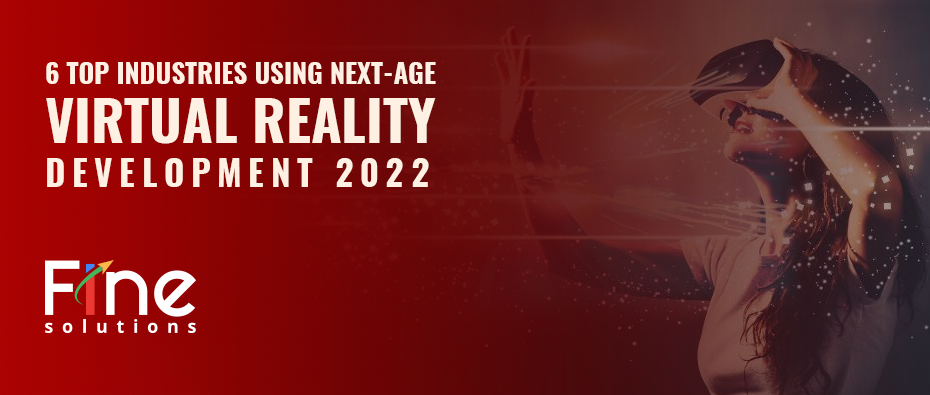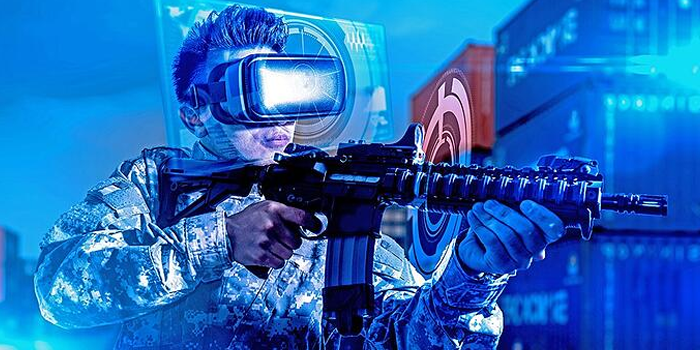
6 Top Industries Using Next-age Virtual Reality Development 2022
February 2 , 2022
Finesols Admin
Blockchain
Virtual reality is a part of the modern world using artificial intelligence to provide enhanced experiences to users worldwide. The virtual reality development of unique and robust technologies has led to the optimized use of computers by simulating the surroundings, leveraging users to interact in a 3D visual environment. Users can relate to VR by wearing a helmet, glasses, a large screen, and some hand controllers. The experience provided to users can be similar or different from the real world. In an ever-growing world, we often relate VR to video games that have taken over the industry with unique futuristic games.
Virtual reality games have changed the dynamics of the gaming industry, but now other sectors like health, education, automotive, etc., are reshaping the future. Like the garage management software is going virtual to provide unique experiences to drivers and racers, providing virtual garage assistance from managing day-to-day operations like invoicing, tool management, online booking, etc. VR, AR and MR are the future of every development. Businesses are integrated into their new models to reap the most benefits. Moreover, consumers are taking a keen interest in exploring and interacting with the latest advanced technology, creating an immersive environment. Many big brands like Intel and Microsoft are using VR to explore new horizons and double the power of digital strategies. Let’s have a quick insight at few of the industries that have implemented VR.
6 Use Cases of Virtual Reality Development
-
Healthcare

Virtual reality, combined with augmented reality, facilitates doctors with new, more effective treatments and medications. Virtual reality development is helping doctors diagnose phobias and anxieties by assisting patients to overcome real-life traumatic scenarios that create fear in an individual. Injections are things that everyone dreads, especially the kids; VR is innovating technology that may help children get treatments in a pain-free method. Moreover, it has changed the operating rooms while enabling medical students to gain immersive education. Medical students use virtual reality to practice surgeries in simulated learning environments, letting students earn from their mistakes. This leads to improved diagnosis, minimized risks, and more productivity.
-
Automotive

Virtual reality is all about simulating the real world, where people can experiment, explore and learn from physical scenarios in a controlled environment. Automotive is another giant that has integrated virtual reality allowing the designers and engineers to explore new vehicle designs before developing expensive prototypes. BMW and Jaguar Land Rover are a few examples using VR to design and check object obscuration of the automotive before manufacturing the car. Furthermore, it helps reduce the manufacturing time and costs. Above that, it provides remote supervision, real-time instructions and helps businesses automate the production lines. It also allows employees to work simultaneously and collaborate remotely with a VR social platform. The automotive companies are training their engineers and designers with VR to help them learn and adapt to the practices quickly without causing any real damage. Lastly, it has given rise to virtual garages using garage management software to maintain the tools and services while providing virtual assistance with online booking, invoicing, etc.
-
Education

Education is universal where every industry integrates it into its business models to help employees learn effectively and efficiently. What could get best than creating an immersive environment to educate and train people in a simulated environment. This builds the interest of the users or learners with animated timeliness function, attractive geography, visualized events, etc. Schools are using virtual reality, leveraging students to engage in a 3D environment. Schools will no longer require to take students on actual field trips. Instead, they can enjoy virtual trips. Moreover, the most significant benefit it has is to cater to the mentally and physically abled people or students. The new research has found virtual reality to be the safest platform for children suffering from Autism Spectrum Disorders (ASD).
Furthermore, universities use virtual reality to take students on tours to places, explore the human body, travel to galaxies, etc. The VR classrooms and meeting rooms have changed the way people interact and learn.
-
Military

Virtual reality development got quickly adopted into the military service by simulating the environment to train the forces. VR is implemented in the army, marines, navy, coast guard, and air force. VR integration in the military lets the trainee practice in multiple situations, environments, and places to diversify the learning skills. The military uses battlefield simulations, medic training, virtual boot camps, and flight simulations, among other many practices, to provide 360 –degree training. We all know virtual reality is a unique, immersive, visual, and sound-based experience used to simulate dangerous situations to prepare soldiers for unseen threats. The military uses it to improve the communication skills to deal with local and international civilians once on the battlefield. Lastly, Virtual Reality Expose Therapy helps treat PTSD soldiers to adjust back to everyday life after traumatic battlefield experiences.
-
Sports

When every industry is striving to get better by implementing next-age technologies like virtual reality, the sports industry has also entered the future of immersive experiences and learning. Hence, this has given rise to e-sports letting gamers play and train for sports. Many famous brands have entered the VR platform to provide top-notch experiences to people. Most importantly, it gets used to train and measure athletic performances. It also helps players enhance their cognitive abilities. Broadcasters stream live games using VR. Live sports are the best way to keep people engaged and deliver world-class experiences for people who cannot afford or attend real-life sports events. Unlike virtual garage management software, it just trains the drivers to race. Moreover, players and viewers can play or watch games remotely at less cost.
Companies train gamers with racing motion, force feed, skydives, manual shifters, skiing, etc., while optimizing experiences for people wearing VR simulators. Soon, e-tickets will get sold to people to watch or attend live games from anywhere in the world.
Virtual reality is an advanced solution to most emerging global problems that reduce the companies’ overall cost while providing exceptional training and enhancing consumers’ experiences across multiple industries. Like companies adopting blockchain for business transactions, VR provides safe training and improved solutions, securing the future with transparency and digitalization. The above were a few use cases or examples of virtual reality getting utilized in a few industries. In contrast, numerous sectors like entertainment, tourism, retail, marketing, fashion, real estate, etc., empower the future.
Also Read: 10 Best Augmented Reality Apps For Android And Ios In 2022




